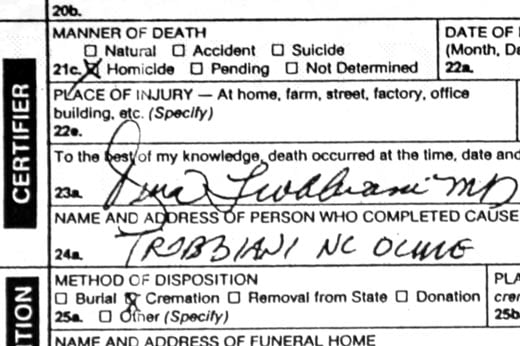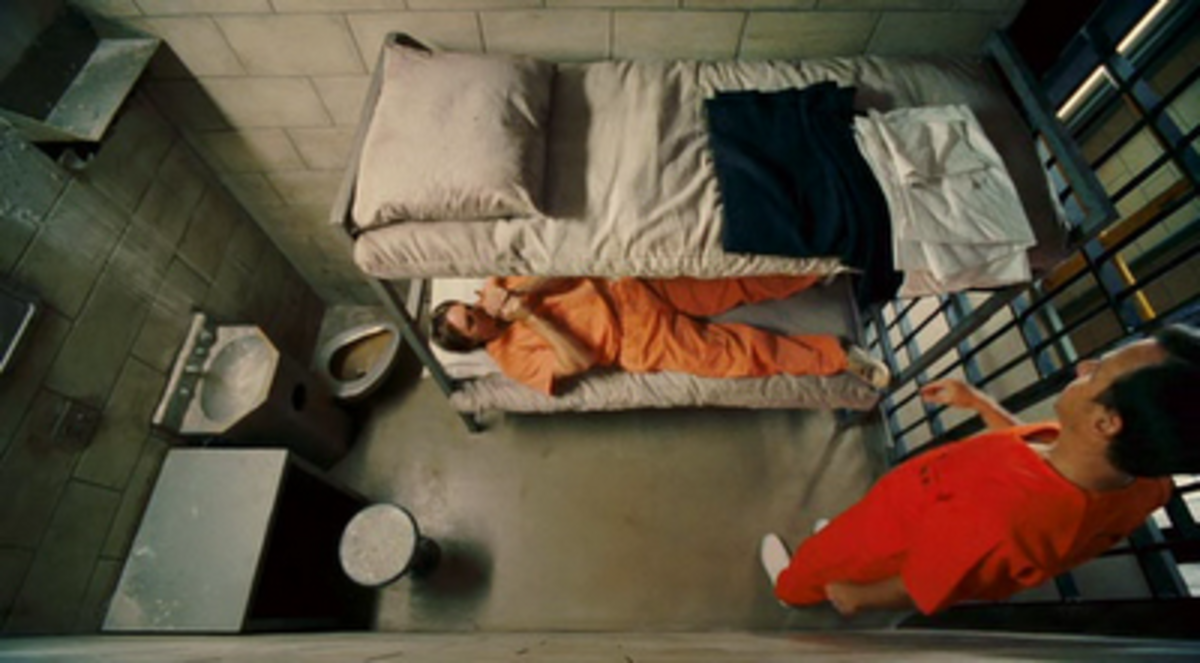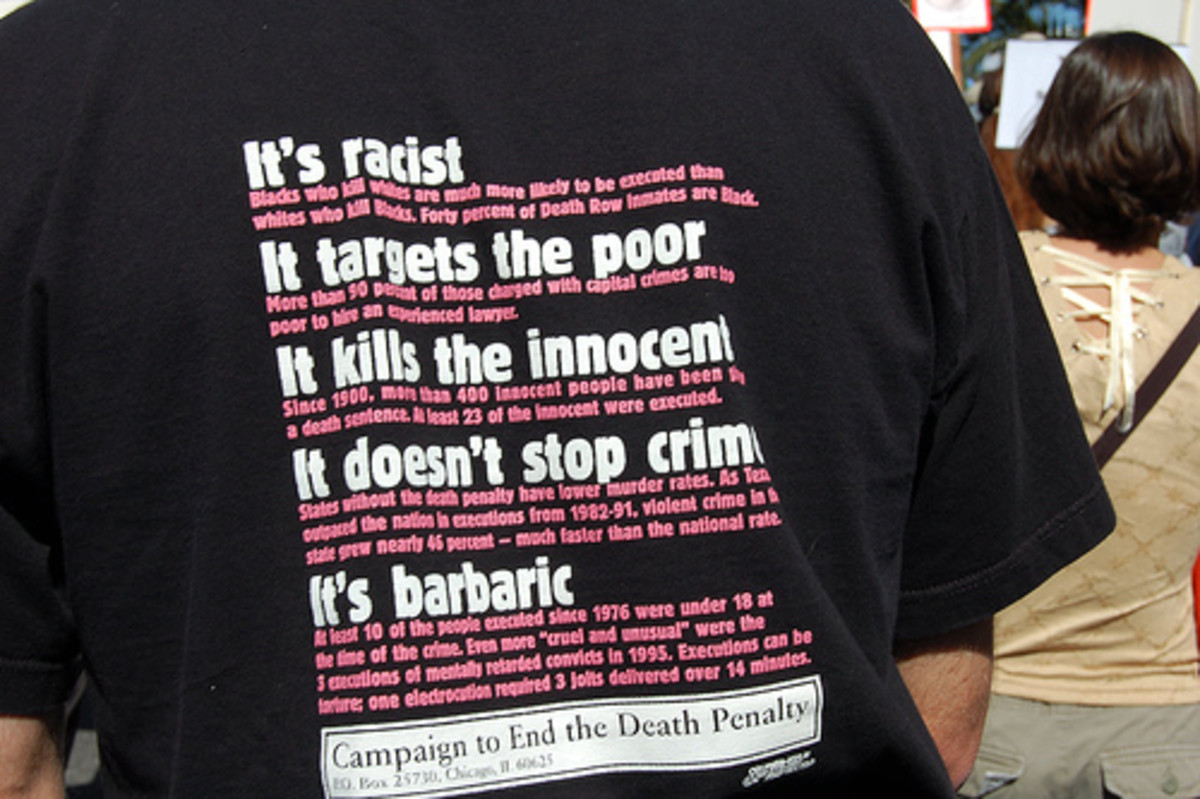The Death Penalty, Exoneration and Botched Executions



A dead man is good for nothing
Many of the states in the United States use inmates for hard labor. Mississippi, Louisiana, and Alabama still use chain gangs.
After executing a person he has nothing further to offer to the society he has harmed. If we are using the death penalty as punishment, for the good of society, would it not be better to use these condemmed offenders in public works that would benifit society. Executing them benefits no one except the executioner.
As a deterrant the lifetime slavery of hard labor by an inmate makes more of an impression and serves as more of a deterrent than execution which suprises us with its violence, but whose effect is only temporary and soon forgotten until the next execution.
Lifetime incarceration causes more suffering and cruel moments than the death penalty which exerts all its power at once then is over.
The only justification for a society using the death penalty is that it has become so brutal and degraded that its people can not be restrained and society kept safe by any other means.

Higher Crime rates suggest death penalty not a deterrant
The rising crime rates suggest that as a deterrant the death penalty is not working.
On any given day you can open the local newspaper or turn on the news and see murder, rape and robbery, and every other imaginable type of crimes against society. The fact that the person commiting the crime could be put to death in some cases such as murder, seem not to even cross the offenders mind. Even with the high rate of executions in Texas we still have an ever increasing crime rate. This is often obsecured by the manner crimes are reported and the fact that many such as rape or domestic violence is not reported.
Many times a plea deal where the offender will plead guilty if the death penalty is taken out of the equation makes it a null threat or risk that many will take.
Even if we do execute the person, unless we are family or friends of the person being executed, or the victim, it doesn't have that much of an impact on us . It is just another fragment of news or a small article in the state section of the paper that is forgotten as soon as the paper is thrown out. It doesn't make the desired impact the state would like.
The fact that executions are held in private and not televised to the public is another reason it is not much of a deterrant. Instead it is foreseen as something shameful, that the state keeps from public view.
Having worked in corrections for over 25 years , I can honestly say that the inmates are punished more harshly by long periods of incarceration than the fear of execution.
I also agree with the argument that "a society who must control their population with the threat of death to maintain order , is a society where the population has become degraded and maybe beyond control by any means".
Countries refuse to sell drugs used for execution to U.S.
In the past years or so the European Union has refused to sell drugs used in executions to the United States. Europe has a stanch and fierce stance against the death penalty. Now the prison systems in the U.S. are scrambling to find a new mixture of deadly cocktails to continue executions. States are now considering using firing squads, gas chambers and other methods to accomplish executions.
Europe states that their mission is to abolish capital punishment not to facilitate it by providing the drugs used in executions. As the U.S scrambles to find an alternative for the denied drugs many of the convicted s' attorneys have filed suits saying that the unproven methods used by the states are "cruel and inhumane" and violate the constitutional rights of the condemned
Since the restriction by Europe there have been several executions that have been botched while looking for a substitution.
Botched executions
In Ohio it took Dennis McGuire 26 minutes to die when he was executed using an untested chemical mixture, he lay gasping as he took his final breaths.
Michael Lee Wilson complained his whole body was burning in a Oklahoma execution and inmate Clayton Lockett struggled, tried to speak and lift himself up off the gurney before officials blocked the witlessness view. He died from a heart attack on the gurney.
In Texas an inmate who was an addict inserted the needle into his own vein when the medical staff could not do it.
These are just some recent examples of executions gone wrong as the U.S scrambles for an alternative to the chemicals that are now restricted by the companies who make them from being used to execute the condemned. '
The Exonerated
Another stumbling block in the execution process is the many recent exonerations pf inmates by DNA evidence. The Innocence Project run by famous attorney, Barry Scheck has become a major force in freeing the innocent many who have served very long sentences for crimes that they never committed.
John Thompson was exonerated after serving 18 years in a Louisiana Prison for a murder he didn't commit. Having been free now for over 6 months he is married ans has steady employment but has to learn to navigate in a world that he has not been a part of and that has changed much since his incarceration.
Last week two men were exonerated of rape and murder after serving 30 years on death row. Henry McCollough and Leon Brown were proven not guilty by DNA evidence. Both men are mentally ill.
These cases and the many others like them should make us take pause before taking a life so lightly. Once someone is executed they are gone forever. There is no bringing them back.
Most states allow for financial compensation for those wrongly accused and incarcerated, but no amount of money can replace years of a persons life, the loss of their family or the struggle to live in a world that they no longer feel a part of.
The Wrongly Executed
Among the most compelling reasons for abolishing capital punishment is the execution of an innocent person. This in itself is a travesty and shame.
Cameron Todd Willingham was executed in Texas after being convicted of setting the arson fire that killed his 3 young daughters. It was later proven by the Texas Forensic Science Commission that the evidence used to convict Cameron was faulty and the fire was not arson. Even with this evidence before him clearing Camron then Govenor Rick Perry refused the 30 day stay that would have saved Camrons life. He was executed in 2009. He refused a plea of life in prison and went to his death proclaiming his innocence. The controversy still continues as the family wants Camorns name cleared post-humously.
Carlos De Luna was 24 when the State of Texas executed him in December 1989 for the murder of a store clerk in Corpus Christi,Texas. It was later proven that De Luna was also innocent of the crime he died for. De Luna maintained his innocence from the time he was arrested until the time he died. Now 29 years after his execution all evidence show that he paid for a crime he didn't commit with his life. The Chaplain who was present at de Lunas execution retired knowing an innocent man was put to death. You can see his story and the story of De Luna in the documentary "At The death House Door".
All of this brings me to ask the question " Have we become a society so out of control that the only way of insuring order is by threat of death" ? The United States is the greatest countries in the world but we lockup more of our citizens than any country in the world.
Maybe we should listen to the European Union and abolish capital punishment some ststes have already done so. Hopefully the others will follow.
Looking for other alternatives
A recent shipment of drugs to be used for execution was seized at the Dallas?Fort Worth airport. Since the European nations have denied access to drugs being sold to the U.S. for use in execution many states are scrambling to find alternatives to do the job. Texas has refused to disclose what drugs it uses and the source.
Maybe it is time Texas put a moratorium on the death penalty as other states have done. Due to the number of offenders who have been exonerated, it crosses my mind that before we use the ultimate punishment we need to be damn sure of the guilt of the condemned. There's no bringing them back once it's done. No amount of money or i'm sorry can replace the loved one lost.
The State Of Texas
The State of Texas was the first jurisdiction to execute an inmate by lethal injection in 1964.
Since 1982 Texas has executed 573 inmates. Governor Rick Perry's administration was in power for 279 0f these.
As of January 2021 Texas has 205 inmates on death row.
This content is accurate and true to the best of the author’s knowledge and is not meant to substitute for formal and individualized advice from a qualified professional.
© 2009 christalluna1124








